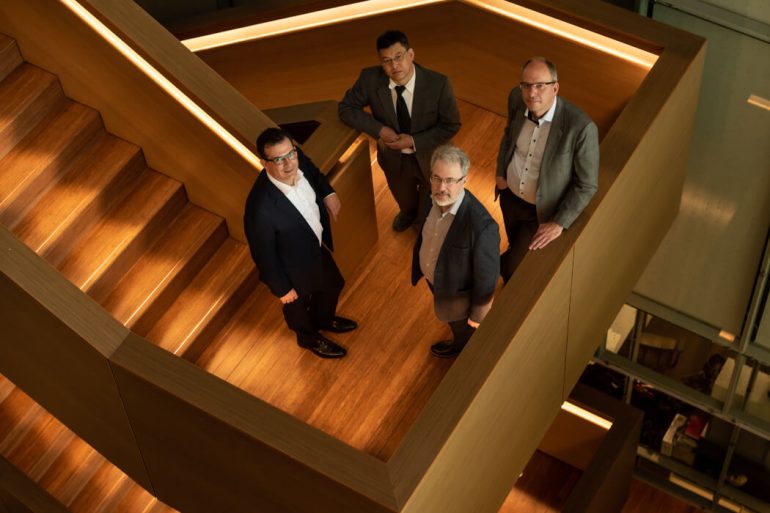Led by a group of cryptography and quantum computing experts from the University of Waterloo, EvolutionQ wants to help organizations ready themselves for quantum computers.
The Kitchener-Waterloo startup has raised over $7 million CAD ($5.5 million USD) in Series A financing led by Quantonation, a Paris-based, quantum technology-focused VC fund, with support from Toronto’s The Group Ventures, to “scale up” its quantum-safe cybersecurity tech.
“The price of being too late is far too great.”
-Michele Mosca, EvolutionQ
Existing cybersecurity infrastructure is built on cryptographic puzzles that traditional computers struggle to solve. But according to experts, quantum computers, which promise to deliver massive jumps forward in processing power, could breeze past these roadblocks.
EvolutionQ co-founder and CEO Michele Mosca believes that amid recent advancements in the space, the time is now for organizations to “future-proof” their systems and ensure they are ready to weather the threat of quantum computers by migrating to quantum-safe cryptography. He should know—prior to launching EvolutionQ, Mosca co-founded the Institute for Quantum Computing at the University of Waterloo, where he also worked as a professor.
“Quantum computers are getting closer and closer,” said Mosca, in an interview with BetaKit. “There’s a lot of awareness of this now—you can already get access to the current prototypes. Now, we know they’re not cryptographically relevant today, but given how long it takes to get cryptographically relevant, we need to be getting ready.”
EvolutionQ aims to ease this process. Founded in 2015 by Mosca and CTO Norbert Lütkenhaus—a pair of University of Waterloo professors and quantum computing experts-turned tech entrepreneurs—EvolutionQ’s all-equity Series A round marks the startup’s first external financing.
The Group Ventures Managing Partner Chanda Carr told BetaKit that the firm was attracted, in part, to the strength of EvolutionQ’s leadership, calling Mosca and Lütkenhaus “second to none in the industry.”
Quantonation Managing Partner Christophe Jurczak echoed the sentiment. He described EvolutionQ as “the most remarkable team of academic founders in the field of quantum-safe cybersecurity, with seminal contributions in the sector and a unique viewpoint; giving them the ability to understand the threat that emerging quantum computers represent for companies, governments, and individuals.”
RELATED: D-Wave hopes to raise $431 million CAD as it prepares to go public via SPAC
Jurczak added that he was particularly impressed by EvolutionQ’s focus on reducing expenses for customers by minimizing tech-switching costs between hardware vendors. “They are providing the missing component to build technologically and economically effective quantum networks,” he claimed.
EvolutionQ was bootstrapped up to this point, getting its start providing advisory services and risk assessments, which Mosca said helped EvolutionQ grow and educate the market for quantum-safe cybersecurity, and provided the firm with revenue during its early days.
Through this process, Mosca said EvolutionQ identified a gap “that we knew we could fill better than anyone else.” Three years ago, the company built and launched its flagship BasejumpQDN software product, which allows organizations building a network based on quantum key distribution (QKD) devices to deploy and manage quantum technologies throughout said network.
According to The Group Ventures Managing Partner Sion Balass, while there are a lot of players supporting quantum safety, many operate in the post-quantum cryptography space, whereas EvolutionQ serves the QKD solution space, which he claims is “significantly less competitive.”
RELATED: Xanadu secures $120 million CAD led by Bessemer to build photonic quantum computer
According to Mosca, “the stakes are very high” given that “almost everything” in today’s world is connected by technology. “It’s the entire economy,” he said. “It’s not just information security and safety … It’s operational technology, cyber-physical systems, driverless cars, implanted medical devices.”
While the development of quantum computers has been slow moving, given that it takes time to ensure systems are quantum-ready, Mosca says organizations can’t afford to wait to update their cybersecurity. “We can’t tolerate much risk here—we need to be ready,” he said. “The price of being too late is far too great.”
To date, several companies have developed quantum computer prototypes, from big tech firms like Google and IBM, to startups like Toronto-based Xanadu.
Xanadu, which is reportedly raising $100 million USD led by Georgian at a $1 billion post-money valuation, recently hit an elusive milestone with its Borealis machine, delivering a result beyond the practical reach of a conventional computer system, according to a paper published in the research journal Nature.
RELATED: The Group Ventures secures $20 million for Fund II to invest in Canadian, Israeli tech startups
Meanwhile, Burnaby-based quantum computing pioneer D-Wave is planning to go public on the NYSE as part of a $431 million CAD SPAC deal that is expected to close during the second quarter of this year.
While VC funding has cooled in recent months amid a broader market slowdown, cybersecurity investment has remained high, benefitting firms like EvolutionQ and Vancouver and Mountain View, California-based LimaCharlie.
EvolutionQ—like D-Wave—has a presence in Germany, where the company opened an office in 2020. The startup plans to invest the fresh capital in sales, marketing, and engineering, as it looks to grow its presence both in Canada and internationally, and expand its product.
From a customer standpoint, the startup targets its tech and advisory services towards financial institutions, which Mosca said have a high degree of cybersecurity maturity, resources, and talent, and have been amongst EvolutionQ’s earliest adopters. EvolutionQ also works with parts of government, and players in the information technology and healthcare spaces.
Feature image of EvolutionQ CEO Michele Mosca, Chief Cryptographer David Jao, CTO Norbert Lütkenhaus, and VP Brian Neill, courtesy EvolutionQ.


